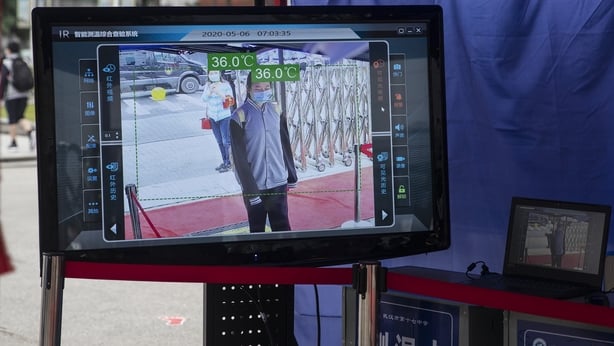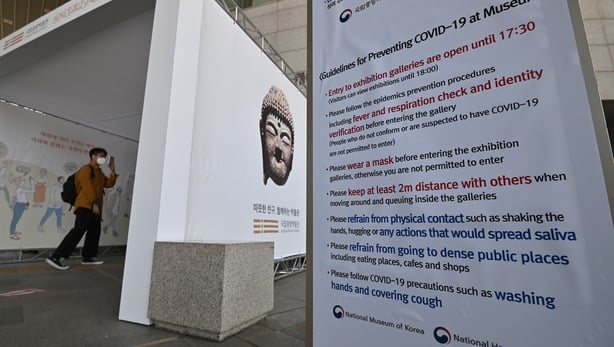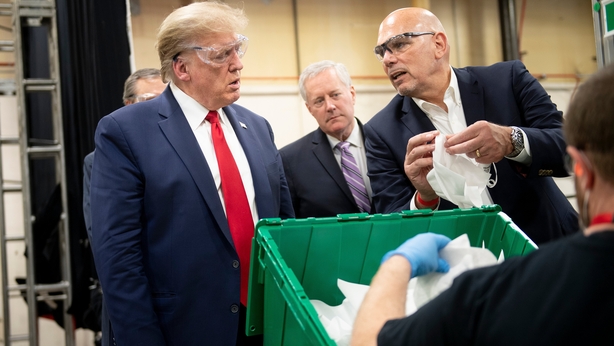Chinese students in the global virus epicentre of Wuhan filed back to class this morning, wearing masks and walking in single file past thermal scanners.
Secondary school students in 121 institutions were back in the classroom for the first time since their city shut down in January.
Teenagers sat at individual desks spaced a metre apart, seeing their teachers in the flesh after months of distance learning.
Today's back-to-school was the latest step in a gradual normalising of life in Wuhan and surrounding Hubei province, where the coronavirus is believed to have emerged late last year before spreading around the world.
Only the province's oldest students were present - seniors who are due to take make-or-break university entrance exams.
Return dates have not yet been confirmed for junior and middle school students.
Officials in Wuhan say students and staff must all have had virus tests before going back to school, and campuses have been disinfected and cleaned.
In preparation for reopening, some schools spaced out their desks and organised smaller class sizes, according to local media.
Thermal scanners greeted everyone walking through school gates, and anyone with a high temperature was not allowed in.

State-run China Daily said some places arranged staggered arrival times for teachers and students.
Elsewhere in China, schools that have been closed or online-only since January began gradually reopening last month, with Beijing and Shanghai letting some students return last week.
China's major cities are gradually returning to normal after imposing strict travel restrictions and closing huge swathes of the economy to control the spread of the virus.
In recent months infections nationwide have dwindled, and there have been no new cases reported in Hubei province for over a month.
Over a five-day holiday at the start of the month, there were 115 million domestic trips, with many tourist sites reopening, although with limited attendance.
Shanghai Disneyland will reopen next week, with enhanced safety measures, including temperature screening and social distancing.
However, foreigners are still banned from entering the country as China works to contain infections being brought in from overseas.
Chinese nationals returning home must undergo 14 days of quarantine.
South Korea returns largely to normal as outbreak controlled
South Korea returned largely to normal as workers went back to offices, and museums and libraries reopened under eased social distancing rules after new coronavirus cases dropped to a trickle.
The country endured one of the worst early outbreaks of the disease outside China and while it never imposed a compulsory lockdown, strict social distancing had been widely observed since March.

But it appears to have brought its outbreak under control thanks to an extensive "trace, test and treat" programme that has drawn widespread praise.
In a population of 51 million, its death toll is little more than 250.
New cases have slowed to just a handful, with 13 in the past three days, all of them arriving international passengers. More than 90 of the imported cases are returning citizens.
Some professional sports, including baseball and football, are starting their new seasons this week after being postponed over virus fears, although the matches will be played behind closed doors.
Schools are to reopen in stages starting from 13 May.
Trump urges US to reopen as daily death toll spikes
US President Donald Trump made his first major foray out of the White House since the coronavirus lockdown began in a push for economic reopening as the daily US death toll from the disease spiked.
It came as the UK became the country with the second most deaths in the world at 32,000, putting it above Italy.
Elsewhere in Europe, hard-hit Spain and France reported a levelling off of figures, offering hope that life could slowly start returning to normal, but in Latin America the death toll passed 15,000.
With experts warning of a severe global recession, many governments have been easing stay-at-home measures to try to revive reeling economies.
"We can't keep our country closed for the next five years," Mr Trump said on a trip to a mask-making factory in Arizona, conceding that some people would be "badly affected".

In the latest sign his administration no longer considers the pandemic its top daily priority,the White House is set to disband the emergency task force handling the outbreak.
"I think we're starting to look at the Memorial Day (May 25) window, early June window" for shutting it down, Vice President Mike Pence said.
Mr Trump urged US states to ease restrictions as he attempts to fire up the world's biggest economy before the November presidential election, when the high death toll and millions of lost jobs could cost him dearly.
I was thrilled to be back in the Great State of Arizona with the incredible, patriotic, and hardworking men and women of @Honeywell! https://t.co/z8XOjmFquB
— Donald J. Trump (@realDonaldTrump) May 5, 2020
At least 256,422 people have died of the novel coronavirus since the epidemic surfaced in China late last year, according to an AFP tally.
The US registered 2,333 more deaths over the 24 hours to yesterday, according to a Johns Hopkins University tracker, more than twice as many as the day before.
Some scientific models suggest the figure will rise to 3,000 a day by June.
In New York, the challenge was further highlighted when 15 children were hospitalised with a rare inflammatory disease possibly linked to the coronavirus, raising alarm in the medical community.
The children were diagnosed with Kawasaki disease, a mysterious illness that causes the walls of arteries to become inflamed, resulting in fever, skin peeling and joint pain.
Four of the patients tested positive for Covid-19 and six were found to have antibodies, suggesting they had previously been infected.
Countries across the world are balancing the need to revive stalled economies against the risk of a new wave of deadly infections.
In Germany, regional leaders pushed back against Chancellor Angela Merkel's pleas for caution, with the biggest state Bavaria saying it would reopen restaurants and hotels this month.
Hong Kong announced plans to reopen schools, cinemas, bars and beauty parlours from Friday, while Californian bookshops, florists and clothing stores will also be allowed to reopen at the end of the week.

